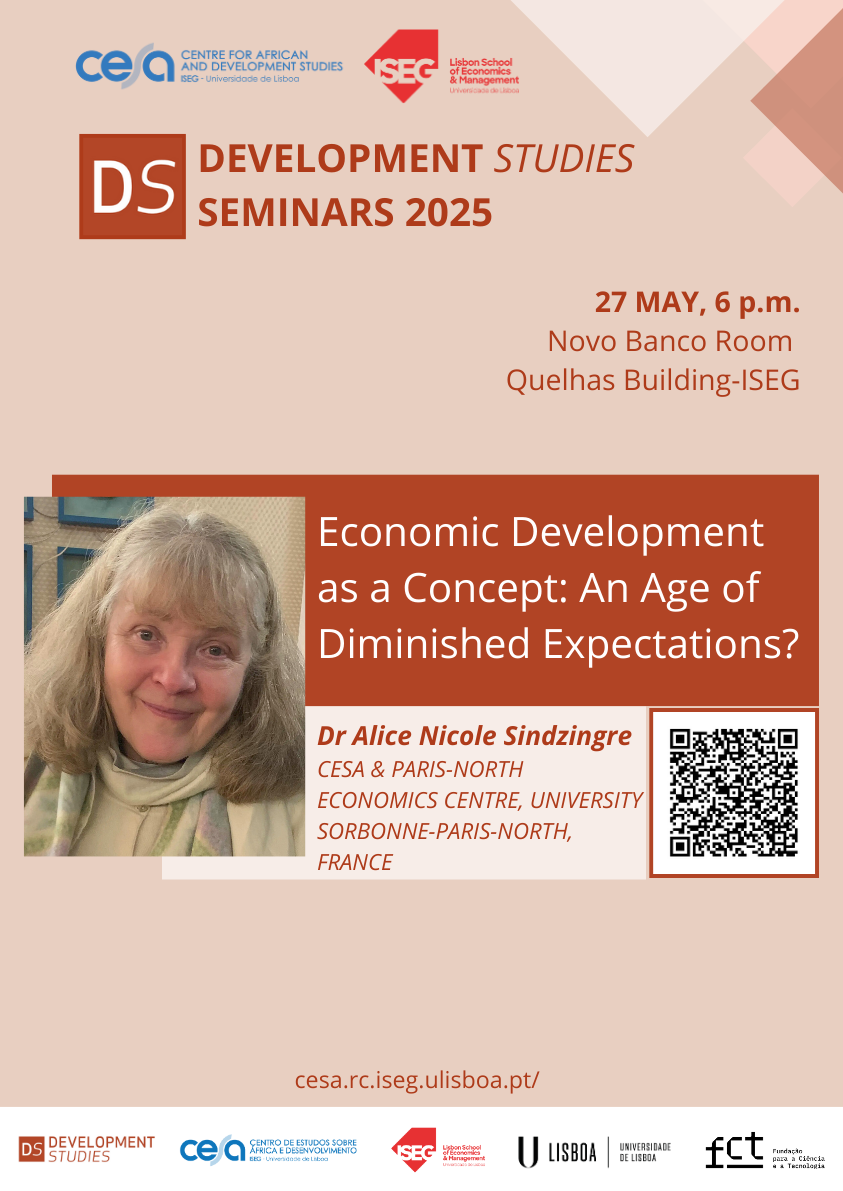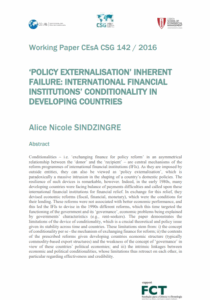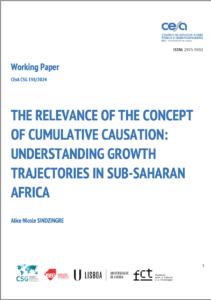Development Studies Seminars 2025 | Economic Development as a Concept: An Age of Diminished Expectations?
The Development Studies Seminars are an initiative that, since 1991, promotes research carried out in the areas of study of the Masters in Development and International Cooperation (MCDI) of ISEG and the PhD Programme in Development Studies of the University of Lisbon

Development Studies Seminars 2025
Topic: Economic Development as a Concept: An Age of Diminished Expectations?
Presenter: Professor Alice Nicole Sindzingre (CEsA & Paris-North Economics Centre, University Sorbonne-Paris-North, France)
Date: 27 May 2025 (Tuesday)
Hour: 6 p.m. – 8 p.m.
Venue: Novo Banco Room, 4th Floor Quelhas Building, ISEG (Access by Rua do Quelhas 6 1200-731, Lisbon, Portugal)
Free admission, in person event. Lecture in English.
About Alice Nicole Sindzingre

Alice Nicole Sindzingre is Research Associate at the CEPN (Paris-North Economics Centre, University Paris-North, France), and at the LAM Research Centre (‘Africas in the World’, National Centre for Scientific Research/CNRS-SciencesPo-Bordeaux, France). She taught in 2008-2010 at SciencesPo-Paris and in 2010-2014 in the department of economics of the University Paris-Nanterre. In 2005-2008, she wrote the monthly column on the theories of economic development in the French newspaper Le Monde. She has been a member of the Core Team of the World Bank World Development Report 2000-1 on poverty. She has conducted research on development economics and political economy as well as fieldwork in Sub-Saharan Africa (mainly in West Africa). She has published a great number of articles in academic journals and edited books on a large range of topics, including international trade, regional integration, foreign aid, China-Africa relationships, poverty traps, the theory of institutions, and the epistemology of economics.
Author’s publications with CEsA:
 Working Paper # 142/2016: ‘Policy Externalisation’ Inherent Failure: International financial institutions’ conditionality in developing countries
Working Paper # 142/2016: ‘Policy Externalisation’ Inherent Failure: International financial institutions’ conditionality in developing countries
Abstract: Conditionalities – i.e. ‘exchanging finance for policy reform’ in an asymmetrical relationship between the ‘donor’ and the ‘recipient’ – are central mechanisms of the reform programmes of international financial institutions (IFIs). As they are imposed by outside entities, they can also be viewed as ‘policy externalisation’, which is paradoxically a massive intrusion in the shaping of a country’s domestic policies. The resilience of such devices is remarkable, however. Indeed, in the early 1980s, many developing countries were facing balance of payments difficulties and called upon these international financial institutions for financial relief. In exchange for this relief, they devised economic reforms (fiscal, financial, monetary), which were the conditions for their lending. These reforms were not associated with better economic performance, and this led the IFIs to devise in the 1990s different reforms, which this time targeted the functioning of the government and its ‘governance’, economic problems being explained by governments’ characteristics (e.g., rent-seekers). The paper demonstrates the limitations of the device of conditionality, which is a crucial theoretical and policy issue given its stability across time and countries. These limitations stem from: i) the concept of conditionality per se – the mechanism of exchanging finance for reform; ii) the contents of the prescribed reforms given developing countries economic structure (typically commodity-based export structures) and the weakness of the concept of ‘governance’ in view of these countries’ political economies; and iii) the intrinsic linkages between economic and political conditionalities, whose limitations thus retroact on each other, in particular regarding effectiveness and credibility.
Link: https://repositorio.ulisboa.pt/bitstream/10400.5/11719/1/wp142.pdf
Working Paper # 198/2024: The Relevance of the Concept of Cumulative Causation: Understanding growth trajectories in Sub-Saharan Africa

Abstract: Differences in growth trajectories among countries – including the possibility of divergence –, are a central issue in economics. Mainstream economics explain growth processes via varieties of neoclassical models, even improved with concepts such as institutions. Yet such models have difficulties in providing accurate accounts of the growth trajectories of many developing countries, notably low-income ones. It is argued that the growth paths of low-income countries are more appropriately explained by the theoretical framework that relies on the nexus of concepts of cumulative causation, non-linearities, threshold effects, self-reinforcing processes, irreversibility, path dependence and traps – though this approach remains marginal in mainstream economic analyses of growth and development. Firstly, this nexus of concepts is a powerful framework concerning the possibility and explanation of dynamic divergence regarding growth between countries, as it exhibits properties such as: the possibility of cumulative, dynamically self-reinforcing, processes; the existence of thresholds and tipping points; multiple equilibria. Secondly, cumulative causation, by definition, involves a combination of causes: its conceptual framework allows for the integration of several dimensions – economic, political, social, cognitive –, whose combination results in either virtuous or vicious circles. In developing countries, these causes (and their coalescence) typically consist in economic structures (e.g., commodity-based export markets), political institutions and social norms (predatory regimes, high inequality) as well as types of public policies.
Link: https://repositorio.ulisboa.pt/bitstream/10400.5/30144/1/Working%20Paper_198-2024_FINAL.pdf
Author: CEsA Communication (comunicacao@cesa.iseg.ulisboa.pt)
Images: CEsA/Reproduction





